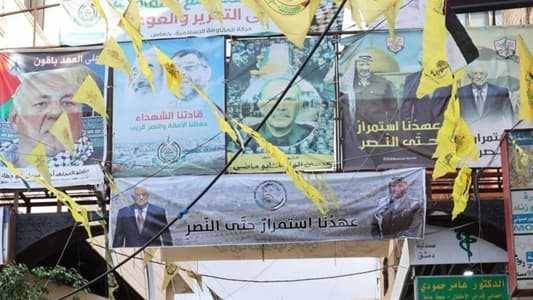The "Middle East" reported: "Palestinians in their camps in Lebanon are closely following the developments of the war in Gaza, not only due to their shared cause but also because many refugees in Lebanon have family ties with their relatives in the camps of Gaza and the West Bank. In the Burj al-Barajneh camp in the southern suburbs of Beirut, Hayat Shahada holds her mobile phone, her eyes on the TV, waiting for news or a message from her daughter who is stranded with her three children in the Gaza Strip after communication with them stopped for a week." Hayat Shahada (69 years old) told the French Press Agency: "Since the war in Gaza began, I have been anxious. I wake up at three or five in the morning and turn on the TV." She adds, "I don't just cry for my daughter, but for all the people of Gaza."
Amid difficulties in communication, Shahada tries to keep herself composed, but her fear for her daughter is evident in her trembling voice. She sadly recounts how her daughter, who preferred not to be named, distributed her children among relatives in an attempt to protect them. She explains: "More than a week ago, she was crying and told me (I distributed my children) so that if one of them dies, the other could remain alive." The Burj al-Barajneh camp, like all Palestinian refugee camps in Lebanon, has a high population density, with homes and buildings tightly packed together. Residents complain about a lack of basic services for water and sewage systems, while hanging electrical wires almost block the light in some alleys. According to estimates from the United Nations, 250,000 Palestinian refugees live in Lebanon, most of whom are distributed among 12 camps established successively following the Palestinian Nakba and the establishment of the State of Israel in 1948.
Hayat Shahada's daughter spent five years in Lebanon and returned to Gaza months ago after her husband came to take her. Today, she moves "from one area to another" in the Strip to escape the bombardment. Her mother says she does not know where her daughter is currently staying, as Israeli operations have forced more than 1.65 million Palestinians in Gaza to flee their homes due to the shelling, following Israeli warnings to leave the northern part of the Strip and head south, which is not spared from Israeli airstrikes. Amid the ongoing blockade and shortage of food supplies, the World Food Program warned on Thursday that residents of Gaza face "an immediate risk of starvation." Communication has been almost completely cut off in the past two days due to fuel shortages.
The Shahada family is among the 750,000 Palestinians who were forced to leave their villages and towns during the Nakba, especially after the massacre of the village of Deir Yassin committed by Zionist militias in April 1948, which killed more than 100 villagers near Jerusalem. Shahada hopes to speak with her daughter, even for just a few moments, to tell her: "Don't cry, your tears are precious to me."
In the alleys of the Burj al-Barajneh camp, pictures of the late leader Yasser Arafat rise along with slogans supporting the "Flood of Al-Aqsa" operation. Fatima al-Shawah (61 years old) follows the news of the operation moment by moment from her modest apartment, hoping to hear news about around 70 family members living in the Strip, the oldest in their seventies and the youngest a baby who has not yet turned one. They lived in Beit Hanoun in northern Gaza but fled in response to the Israeli bombardment from one area to another, with some taking refuge in schools in Rafah in southern Gaza. Al-Shawah, originally from Kabri in Acre, says: "Their houses are all destroyed, and the homes of their children are destroyed as they are on the front lines. Nothing is left." She tries to communicate with her relatives as much as possible, sometimes hearing the sound of bombing around them or the screams of children. She adds: "On the day they don't reassure us about their situation, our hearts boil with fear for them," and they tell her: "They are terrified and hungry, while the children are scared."
Sometimes, Fatima al-Shawah feels she cannot bear this level of suffering, even hearing the bombardments and the screams through the screen. When she remembers her last visit to Gaza last July, her eyes well up with tears, and she smiles when recalling the images of her family welcoming her eagerly to the drumbeats and music at the Rafah border crossing with Egypt. She says, "I wish I had never gone to Gaza and seen the good people there." She adds, "I wish Gaza would return to what it was, but while everyone is calling for a ceasefire, Israel does not listen to anyone."




